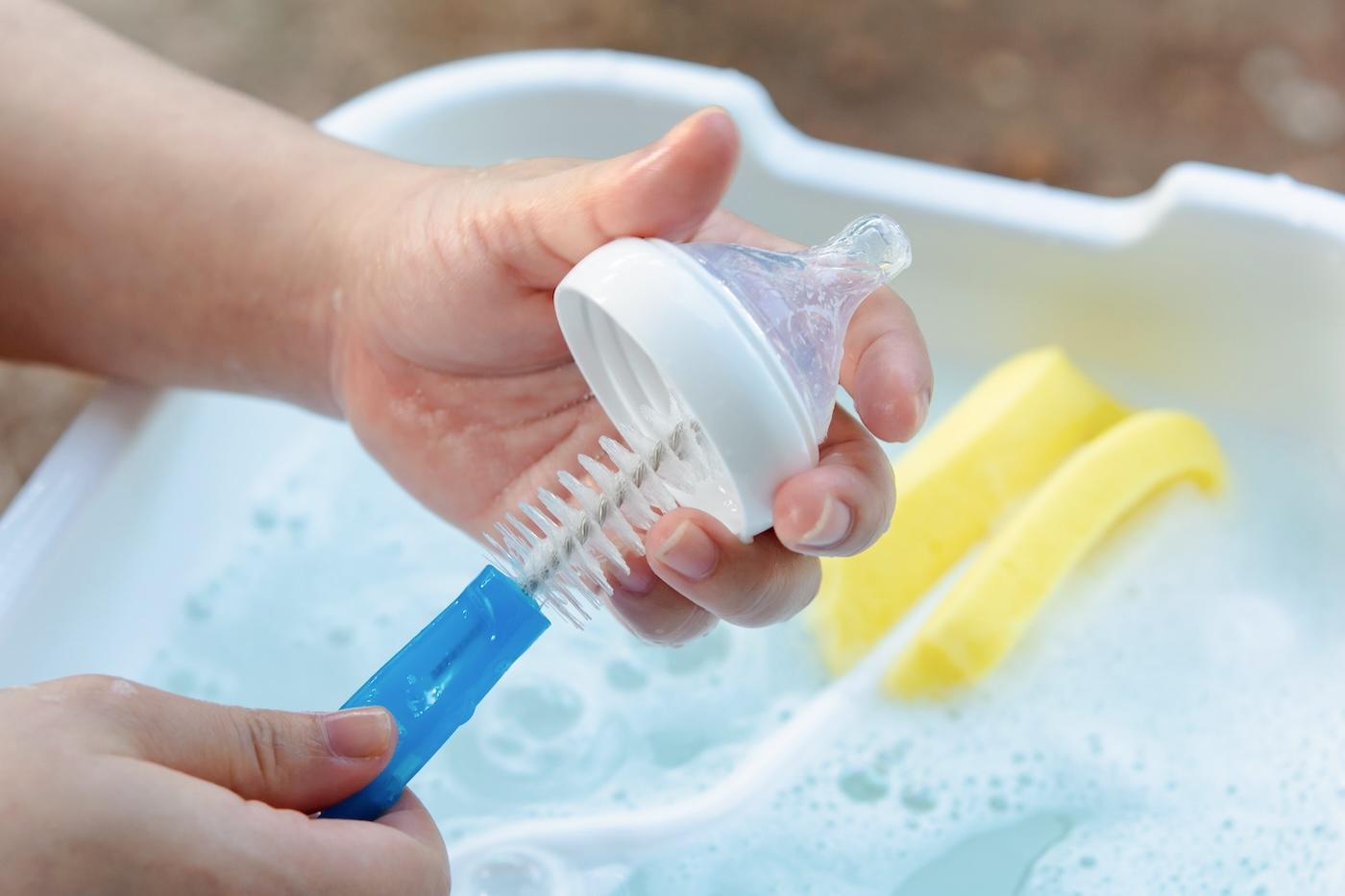BABY
Meconium: Your Newborn’s First Poop, Explained
Here’s what you need to know about Baby’s first number two.

Written by
Dr. Harvey Karp

Of all of the monumental changes that come with becoming a parent, one of the strangest rites of passage has to be your new fixation with baby poop! It doesn’t take long for parents to become experts in their baby’s varied bowel movements—and not just because you’re up to your elbows in diaper changes. (Newborns can soil up to 12 diapers a day!) Poop can actually be a helpful indication of your baby’s health. This inevitable poo preoccupation begins the very first time a baby goes number two, producing the epic-sounding (and, frankly, weird looking) meconium. Here’s everything you need to know about your baby’s first poo:
What is meconium?
Meconium is a newborn baby’s first bowel movement…and it doesn’t look like any poop you’re used to! In fact, the look of your baby’s first poop can come as a shock! Meconium is a black-green color, it’s thick, and it’s extremely sticky…more tar than turd, making it a tricky substance to wipe clean. Perhaps the late Robin Williams summed meconium up best when he said it looks like a cross between Velcro…and toxic waste! But the good news is meconium is totally normal.
What is meconium made of?
This amazing poo is made of ingested hair (lanugo, which is the fine hair that covers your baby’s body and often shed before birth), dead skin, amniotic fluid, other cells, proteins, fats, and secretions, such as bile. While it all sounds pretty gross, you’ll be surprised to learn that meconium is almost odorless. That’s because, at birth, a baby has almost no gut bacteria, and bacteria is what makes poop stinky. (Did you know that the poop of exclusively breastfed infants smells sweet? But once solids or infant formula are introduced, baby’s poop gets…odorous!)
How much meconium is normal?
In a baby’s first 24 to 48 hours, expect to glimpse meconium in at least one diaper. But soon that tarry poo will give way to more “normal” looking baby poops.
When will my baby have their first poop?
Most of the time, your baby’s first poop will be passed within 24 hours of birth. At times, it can take up to 48 hours for your newborn to produce a dirty diaper. If it’s taking any longer for your baby to poop meconium, further evaluation may be in order.
What are some other things to know about my baby’s first poop?
After your little one passes meconium, their number of poos per day can vary from one every several day to several poops in one day, with breastfed babies typically pooping more than formula-fed bubs.
What to do if newborn baby hasn't passed meconium in the first poop within 24 hours?
While most babies have their first poop in their first day of life, it could take as long as 48 hours for meconium to show up. If you give birth in a hospital, your care team will likely keep you until your baby has passed their first poop so they can keep an eye on your little one. Sometimes a failure to pass meconium can point to an intestinal obstruction.
How long does meconium poop last?
You’ll most likely be dealing with meconium-filled diapers for a couple of days after birth. But once your newborn starts regularly snacking on your colostrum, which is the first breastmilk your body produces, or a little infant formula, their poop will start to change. When your baby starts eating, bacteria are introduced to their intensities and that changes the consistency, smell, and color of their poop. Breastfed babies go from producing dark green or black tar-y poops with a Silly Putty consistency to a mustard yellow poo with little flecks of white. Formula-fed babies will go from producing meconium to a tan, paste-like poop that may resemble peanut butter. (Sorry if I just put you off PB&J’s forever!)
Why do some babies pass meconium before or during birth?
This is called meconium-stained amniotic fluid (MSAF) and it occurs in 8% to 15% of all deliveries. While it’s possible that any baby can pass a poo before they are born, babies who are overdue or stressed by low oxygen levels or infections are more likely to pass meconium before being born. Also increasing a baby’s risk: A long, hard delivery; maternal health issues such as diabetes or high blood pressure; smoking or drug use during the pregnancy.
What are signs my baby passed meconium before birth?
Normally, when the bag of water breaks, the fluid is clear. But the amniotic fluid will be greenish if your little one passed meconium before or during birth. Even your baby’s fingernails can get stained a little green!
Is passing meconium before birth dangerous?
It can be. If your baby did poo inside, your provider will immediately suction the meconium out of their mouth and nose with a bulb syringe. But if your little one has poor muscle tone and trouble breathing, those are signs they may have breathed the meconium into their lungs before, during, or even after birth. They’ll be taken to a radiant warmer for treatment. Know that as soon as meconium-stained amniotic fluid is spotted, your hospital team will notify the Neonatal Advanced Life Support just in case.
What is meconium aspiration syndrome?
If your baby passes their first stool before birth, the meconium may mix with amniotic fluid and be inhaled during or soon after birth. If doing so pulls the meconium into your baby’s lungs and hinders their breathing, it’s called meconium aspiration syndrome. This can cause serious problems for your little one because meconium can irritate or clog a baby’s airways, injuring lung tissue. It can also block something called surfactant, which is a fatty substance that helps open a baby’s lungs after birth. Up to 5% of babies born with meconium-stained amniotic fluid develop meconium aspiration syndrome.
How is meconium aspiration syndrome treated?
Most often, babies with meconium aspiration syndrome are admitted to the neonatal intensive care unit (NICU) to receive oxygen, if needed. If your little one continues to struggle, folks in the NICU will turn to a breathing machine called a ventilator for additional help. For those with severe meconium aspiration syndrome, treatment may also include:
- Surfactant therapy to help open lungs
- Nitric oxide may be added to oxygen to help open blood vessels and improve oxygen delivery
- Your baby may be hooked up to an extracorporeal membrane oxygenation (ECMO) machine that pumps blood from the body through an artificial lung, adding oxygen to your baby’s blood and removing carbon dioxide…then sending the blood back to your baby.
The good news? With prompt treatment, most babies with meconium aspiration syndrome get better with no problems.
More Newborn Need-to-Knows:
- What to Expect with Newborn Screenings
- Help Getting Your Newborn to Sleep
- Baby’s First Checkup!
- Your Newborn Vaccine Guide
Disclaimer: The information on our site is NOT medical advice for any specific person or condition. It is only meant as general information. If you have any medical questions and concerns about your child or yourself, please contact your health provider.
SHARE THIS ARTICLE
MOST LOVED
Sleepytime Sidekicks












